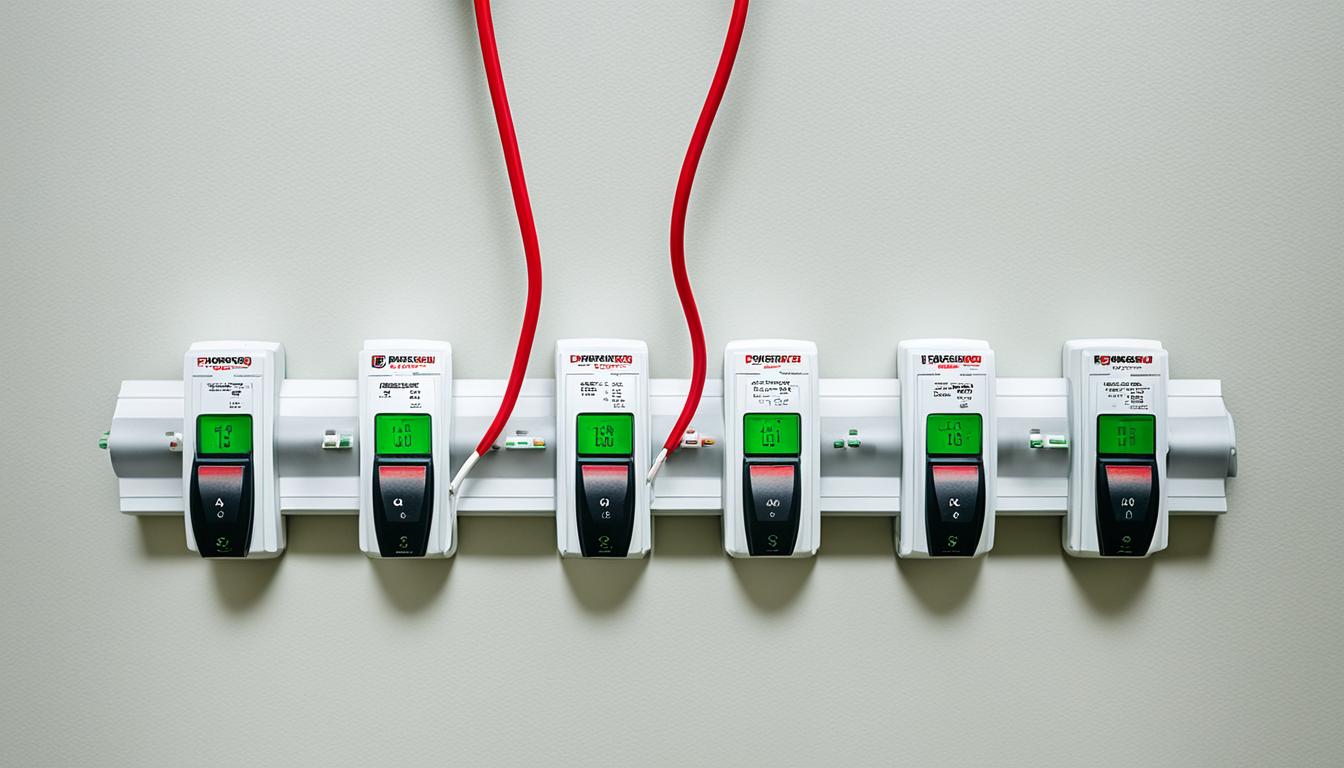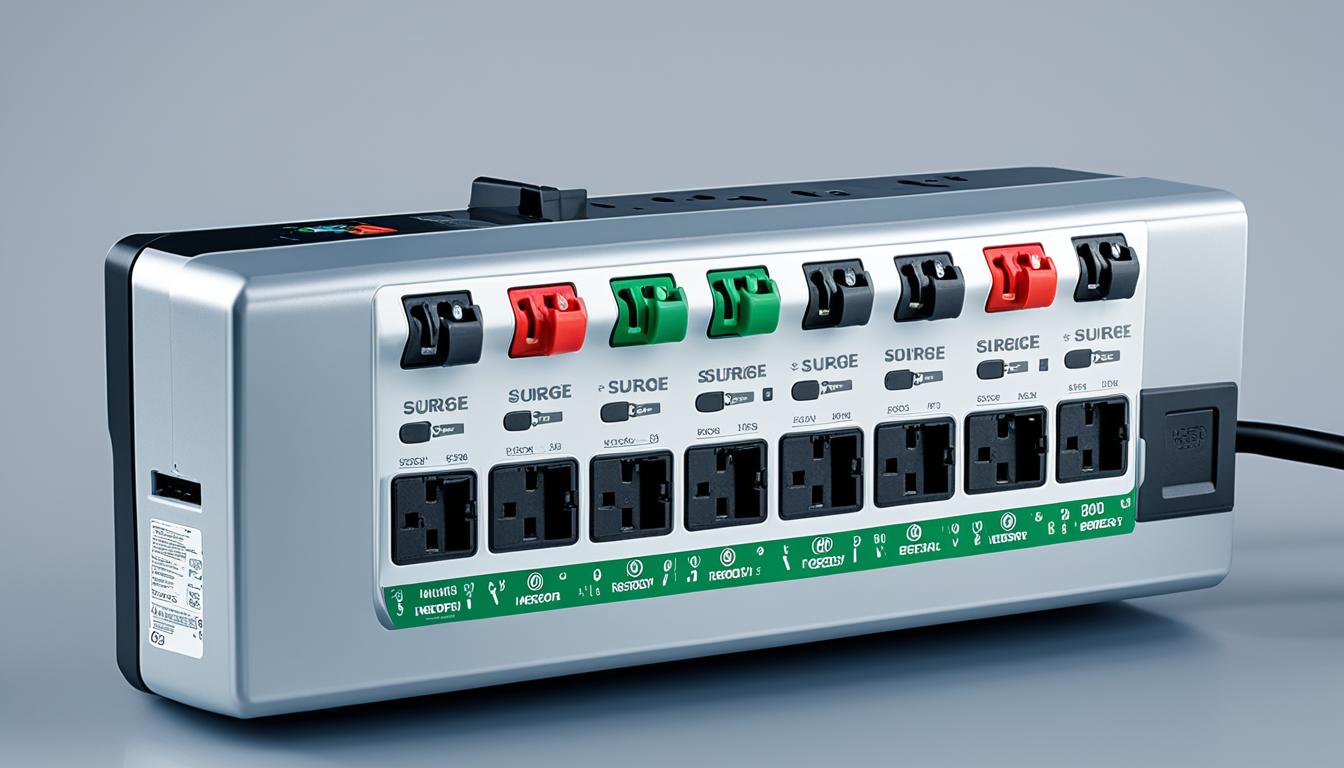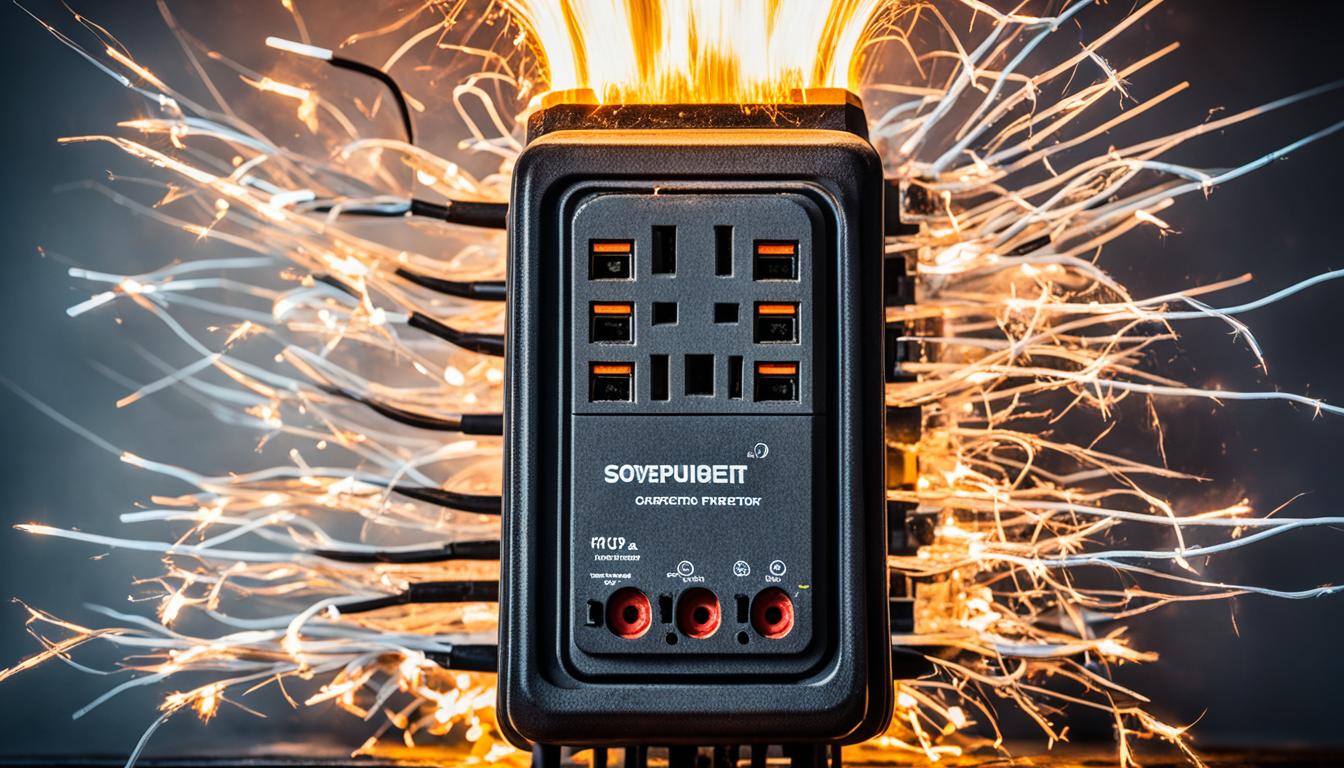extensioncords.site and its partners may earn a commission if you purchase a product through one of our links
When it comes to plugging a microwave into an extension cord, there are important safety considerations to keep in mind. While it may seem like a convenient solution, it can pose potential hazards and affect the performance of your appliance. So, let’s explore whether it’s safe to use an extension cord with your microwave and what precautions you should take.
Key Takeaways:
- Using a properly grounded, dedicated electrical outlet is the best practice for safely powering your microwave.
- If an extension cord must be used, ensure it is a three-wire grounding type appliance cord with a sufficient current rating.
- Extension cords should be placed in a way that minimizes the risk of accidents, and they should not be pulled on or tripped over.
- Avoid overloading circuits by plugging other appliances into the same extension cord as the microwave.
- Inspect the extension cord for any signs of damage before use to ensure electrical safety.
What Extension Cords Work Best With Microwaves?
When using an extension cord with a microwave, it is important to choose the right type of cord to ensure safety and proper electrical requirements. Follow these guidelines to determine what extension cord to use for your microwave:
- Use a three-wire grounding type appliance cord that is UL approved: A three-wire grounding type appliance cord provides the necessary grounding for your microwave, reducing the risk of electrical hazards.
- Match the current rating of the extension cord to the electrical rating of your microwave: Ensure that the extension cord has a current rating equal to or greater than the power consumption of your microwave to prevent overloading the cord.
- Consider a 12-gauge extension cord for higher-powered microwaves: If your microwave has a power rating of 1,000 watts or more, it is recommended to use a 12-gauge extension cord. A higher gauge ensures that the cord can handle the increased power demands.
- Keep the length of the extension cord under 9 feet: Longer extension cords can result in voltage drop and increased resistance, leading to overheating. Keeping the length under 9 feet minimizes this risk.
- Inspect the extension cord for any signs of damage: Prior to use, check the extension cord for frayed wires, exposed conductors, or any other signs of wear and tear. Using a damaged cord can pose safety hazards.
Remember, using the proper extension cord is crucial for the safe and efficient operation of your microwave. Make sure to adhere to these guidelines and always prioritize your safety.
| Type of Extension Cord | Key Considerations |
|---|---|
| Three-wire grounding type appliance cord | – Provides necessary grounding – Reduces risk of electrical hazards |
| Current rating matches or exceeds microwave’s electrical rating | – Prevents overloading the cord – Ensures safe power consumption |
| 12-gauge extension cord (for higher-powered microwaves) | – Handles increased power demands – Minimizes risk of overheating |
| Length of the extension cord should be under 9 feet | – Reduces voltage drop and resistance – Avoids overheating |
| Inspect the extension cord for damage | – Check for frayed wires or exposed conductors – Ensure safe usage |
Reasons You Shouldn’t Plug a Microwave Into an Extension Cord
While it is possible to plug a microwave into an extension cord, it is generally not recommended due to microwave extension cord safety concerns and the importance of following appliance safety guidelines. Extension cords may not be able to handle the high power draw of a microwave, which can lead to overheating and potential fire hazards.
Avoiding fire hazard with microwaves and extension cords is crucial. Using an extension cord with a microwave goes against basic electrical safety guidelines and increases the risk of accidents. It is always best to use a dedicated, properly grounded outlet for microwaves to ensure safe operation and minimize the risk of fire.
By using an extension cord, you introduce several potential hazards. The power demands of a microwave are greater than most other appliances, posing a challenge for standard extension cords. Plugging a microwave into an extension cord can overload the cord and result in overheating. This can potentially ignite a fire, endangering your home and loved ones. To avoid microwave extension cord safety hazards, always prioritize using a dedicated outlet for your microwave.
Additionally, relying on an extension cord for your microwave can lead to a messy and disorganized countertop. The cord may dangle or be easily tripped over, posing a risk of injury. Properly grounding your microwave not only ensures safety but also promotes a clean and clutter-free kitchen environment.
Remember, your safety and the safety of your household should be your top priority. By following appliance safety guidelines and avoiding the use of extension cords with microwaves, you can mitigate potential risks, prevent accidents, and maintain a safe environment in your home.
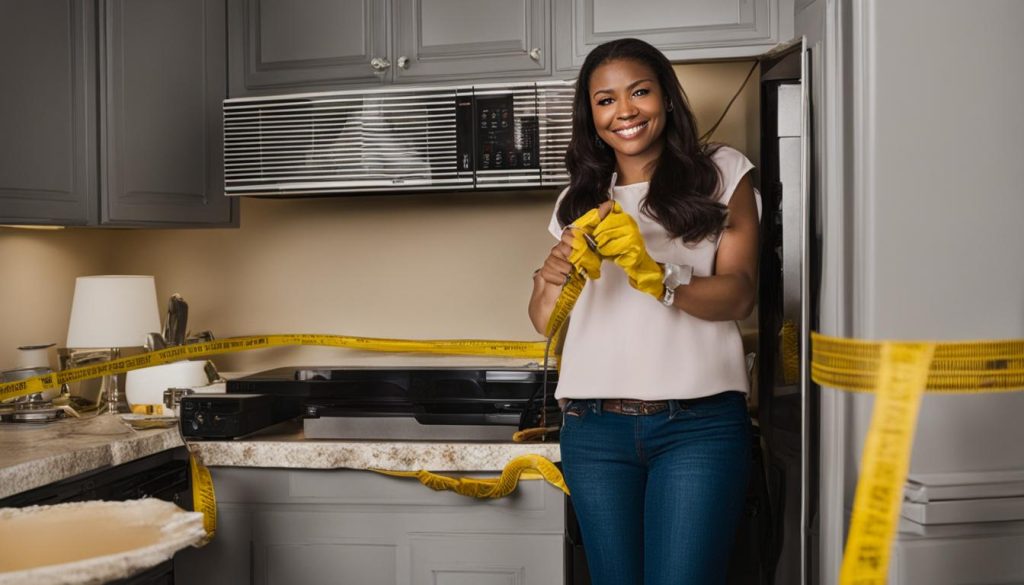
Why Shouldn’t I Plug a Microwave Into an Extension Cord?
- Extension cords may not handle the high power draw of a microwave, leading to overheating and potential fire hazards.
- Using an extension cord with a microwave goes against basic electrical safety guidelines.
- Plugging a microwave into an extension cord increases the risk of accidents and injuries.
- Microwave extension cord safety is paramount to avoid fire hazards.
What to Consider if You Want to Plug a Microwave Into an Extension Cord
If you still choose to use an extension cord with your microwave, there are a few factors to consider:
- Running Length: Keep the running length of the extension cord short, ideally under 25 feet and no more than 50 feet, to minimize voltage drop and resistance.
- Wire Gauge: Choose an extension cord with a wire gauge of at least 12, which can handle the current demands of the microwave. Be cautious of extension cord manufacturers that do not provide transparent information about the gauge and amp rating of their cords.
- Avoid Overloading: Avoid plugging other appliances into the same extension cord or power strip when the microwave is in operation to prevent overloading the circuit.
- Inspect for Damage: Always inspect the extension cord for any signs of damage before use to ensure electrical safety.
By following these considerations, you can mitigate some of the potential risks associated with using an extension cord with your microwave.
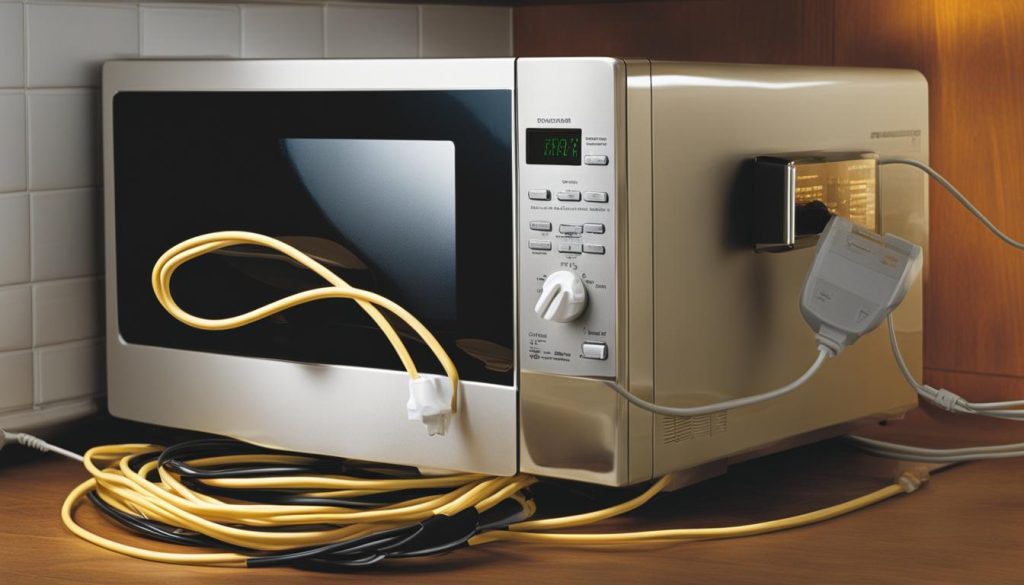
“When using an extension cord with a microwave, it is important to consider the running length, wire gauge, avoid overloading the circuit, and inspect for damage.” – Electrical Safety Expert
Frequently Asked Questions
Here are some common questions related to plugging a microwave into an extension cord:
What size extension cord do I need for a microwave?
- Answer: It is recommended to use a 12-gauge extension cord that matches the gauge and amp rating of the microwave for safe operation.
Can I plug a microwave into any outlet?
- Answer: No, it is important to ensure that the outlet is rated for the correct voltage (120V or 240V) and has a 3-prong configuration for proper grounding.
Can I plug a microwave into the same outlet as other appliances?
- Answer: It is not recommended to plug a microwave into the same outlet as other appliances due to the risk of overloading the circuit and causing electrical hazards.
If you have more questions or concerns about plugging a microwave into an extension cord, feel free to consult the owner’s manual of your microwave or reach out to a licensed electrician.
Conclusion
In conclusion, prioritizing safety when using a microwave is of utmost importance, making it essential to follow proper electrical safety guidelines. It is strongly advised to avoid plugging a microwave into an extension cord if possible, as it can pose potential safety hazards.
Instead, it is recommended to use a properly grounded and dedicated electrical outlet for your microwave. This ensures safe operation and minimizes the risk of flickering lights, blown fuses, and tripped circuit breakers. By using the correct outlet, you can prevent accidents and create a secure environment for your household.
If using an extension cord becomes necessary, ensure that it is a three-wire grounding type appliance cord with a sufficient current rating. It is crucial to examine the extension cord for any signs of damage before use and ensure it is positioned in a way that minimizes the risk of accidents, such as tripping or pulling. Additionally, it is vital to avoid overloading circuits by connecting other appliances to the same extension cord.
By following these electrical safety tips for microwaves and microwave extension cord safety practices, you can ensure the well-being of your household and maintain a secure environment in your kitchen.
FAQ
Can you plug a microwave into an extension cord?
While it is possible to plug a microwave into an extension cord, it is generally not recommended due to safety concerns. Extension cords may not be able to handle the high power draw of a microwave, which can lead to overheating and potential fire hazards. It is always best to use a dedicated, properly grounded outlet for microwaves to ensure safe operation and minimize the risk of fire.
What type of extension cord should I use for a microwave?
If you do decide to use an extension cord with your microwave, it should be a three-wire grounding type appliance cord that is UL approved and has a current rating equal to or greater than the electrical rating of the microwave. It is recommended to use a 12-gauge extension cord, especially for microwaves with a power rating of 1,000 watts or more. The length of the extension cord should be kept under 9 feet to minimize the risk of overheating. Always inspect the extension cord for any signs of damage before use.
Is it safe to plug a microwave into an extension cord?
Plugging a microwave into an extension cord can pose potential safety hazards. It is recommended to use a properly grounded, dedicated electrical outlet for your microwave to prevent flickering lights, blown fuses, and tripped circuit breakers. Using an extension cord with a microwave goes against basic electrical safety guidelines and increases the risk of accidents.
Why is it not recommended to use an extension cord with a microwave?
Using an extension cord with a microwave may cause the interior light to flicker, the fan or blower sound to vary, and longer cooking times. Additionally, extension cords may not be able to handle the high power draw of a microwave, which can lead to overheating and potential fire hazards. It is always best to use a dedicated, properly grounded outlet for microwaves to ensure safe operation and minimize the risk of fire.
What are some electrical safety tips for microwaves?
When using an extension cord with a microwave, keep the running length of the extension cord short, ideally under 25 feet and no more than 50 feet, to minimize voltage drop and resistance. Choose an extension cord with a wire gauge of at least 12, which can handle the current demands of the microwave. Avoid plugging other appliances into the same extension cord or power strip when the microwave is in operation to prevent overloading the circuit. Always inspect the extension cord for any signs of damage before use.
